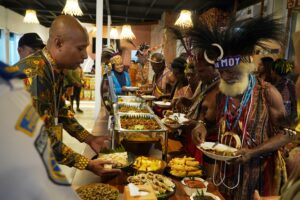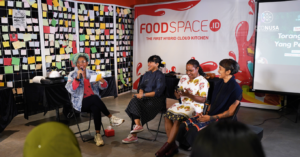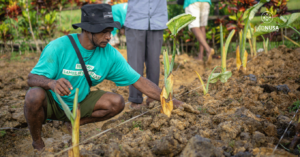
COVID-19 pandemic does not lead the community of Kombif Village, Mare District, Maybrat Regency, in West Papua Province, to hope for donations from various parties to survive their lives. They live self-sufficiently by cultivating their domestic land on the backyard and their surrounding hamlets. Their seeding skill has become one of tools for the local community in Kombif to have food security.
“During the corona pandemic, the community has their own stock of food. The community does not hope for any help as they have vegetables and tubers. That is also due to the running out of rice stocks at the village. But the peoples do not panic as they have sago, patatas, caladium,” said Beyum Antonela, a local resident of Kombif.
Community in Kombif has been accustomed to gardening for a long time. They cultivate their land outside the village by planting spinach, eggplant, tomato, kale, chilly and gebi leaf. Beyum said that the community formerly has not been accustomed to land cultivation surrounding their dwellings. They think that land surrounding the house is not good for planting due to scattered garbage. Let alone, their domestic animals like chicken could possibly damage the plants.
According to Beyum, the Kombif peoples have once relied on the existing shop downtown supplying seeds. The seed pricing varies ranging from IDR 90,000 up to IDR 150,000 per bag. Besides, local people should spend around IDR 600,000 for their transport to the town using four-wheeled drive vehicle.
“It is very expensive. They think the seeds from the shop could hardly raise new seeding. So, we raise new seed from the one we bought from the shop. We encourage the community to have knowledge on how to produce seedlings for their own villages,” said Beyum.
Beyum masters his technical skill for seeding from the School of Social Transformation (SST) at Klayili District, Sorong Regency, in November 2019. SST is part of the series of Eco-Involvement program organized by EcoNusa Foundation in collaboration with INSIST.
During the SST, the participants studied on land cultivation, seeding, organic fertilizer making. They also studied other practical skills such as identification of critical land, soil fertility measuring, water quality, management system of resources and local ecosystem.
“We apply what we got from SST in the village. We combine the soil condition at the village and community experiences. Fertilizer making process and pests spraying have not been applied here. Rather, the community lets the nature make the plants fertile,” Beyum said.
Sustainable agriculture practices at Kombif Village produces plentiful crops. Carmelita Mamonto, the Coordinator of Maluku Region of EcoNusa Foundation, said that peoples in Kombif want to sell their crops such as chilly and fragrant lemongrass and vegetables outside their village as they have sufficed their needs. Unfortunately, their dream is hampered by the poor infrastructure.
“They are impeded by impenetrable road access. In anticipation, the agricultural crops must not be in the form of raw materials, but rather be processed into chili powder or atsiri oil made of fragrant lemongrass,” said Carmelita.
Editor: Leo Wahyudi








